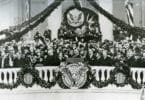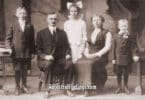In 1933, as Herbert Hoover’s presidency concluded, Americans found themselves searching for a leader who could bring hope to a nation facing unprecedented hardship. That leader was Franklin Delano Roosevelt, a man whose personal resilience, family legacy, and transformative vision would steer the United States through the Great Depression and World War II. Understanding FDR’s journey offers a glimpse into his remarkable life and insight into the influences of a family deeply woven into American history.
Family Roots: The Roosevelts and Delanos
Born on January 30, 1882, in Hyde Park, New York, Franklin came from a distinguished line of Roosevelts. His father, James Roosevelt, was part of a prominent New York family whose roots trace back to Claes Martenszen van Rosenvelt, a Dutch immigrant who settled in New Amsterdam in the 17th century. The Roosevelts became affluent landowners, and by the 19th century, they were regarded as part of New York’s elite, with wealth derived from landholdings, trade, and other ventures. This family history of influence and privilege set the stage for Franklin’s upbringing.
On his mother’s side, the Delano family was equally renowned. Franklin’s mother, Sara Delano Roosevelt, belonged to a lineage that traced back to Philippe de la Noye, one of the Pilgrims on the Mayflower. Sara’s background was marked by resilience and determination, qualities that she would instill in Franklin from a young age. Known for her strong will and devotion, Sara became a significant influence in Franklin’s life, shaping his character and vision for public service.
Marriage to Eleanor Roosevelt: A Partnership with Purpose
In 1905, Franklin married his distant cousin, Anna Eleanor Roosevelt. Eleanor, Theodore Roosevelt’s niece, brought her distinct lineage and commitment to public service into the marriage. Their union was more than a traditional family arrangement; it was a partnership that would ultimately impact the nation. Eleanor was an intelligent, determined woman who would become an essential advisor and advocate throughout Franklin’s career. Together, they navigated the complexities of political life and established a unique partnership that strengthened their legacies.
The marriage faced challenges, notably Franklin’s affair with Eleanor’s secretary, Lucy Mercer, in 1918. This revelation nearly ended their union, but, in the end, they reached an understanding, choosing to continue as partners in life and public service. This decision allowed them to cultivate a relationship based on mutual respect, shared goals, and a commitment to the greater good. Eleanor continued to pursue her humanitarian work, and Franklin supported her efforts, even when they took her on a different path from his own. Their lives exemplified a powerful partnership in service to the nation.
Triumph Over Adversity: Franklin’s Battle with Polio
In 1921, Franklin contracted polio, a disease that would leave him partially paralyzed for life. This battle became a defining chapter in his personal journey, challenging him to confront his physical limitations while maintaining his political aspirations. His struggle with polio not only shaped his character but also deepened his empathy for others facing hardship. Determined to remain active in public life, he learned to rely on leg braces, crutches, and the support of close aides, projecting a powerful image of resilience to the public.
Franklin’s time spent seeking treatment at Warm Springs, Georgia, inspired him to establish a rehabilitation center for polio patients—a legacy that would continue even beyond his presidency. Though he took steps to limit the public’s awareness of his disability, his struggle with polio became a source of strength and humility, making him acutely aware of the challenges that millions of Americans faced during the Great Depression.
Children and Legacy: The Roosevelt Family’s Next Generation
Franklin and Eleanor had six children, five of whom survived into adulthood: Anna, James, Elliott, Franklin Jr., and John. The Roosevelt children, often in the public eye, led lives marked by achievement and challenge. Raised under the shadow of their father’s growing political career, they encountered the pressures that come with a prominent family name. Some children pursued public service, reflecting their parents’ dedication, while others faced personal struggles, including multiple marriages and controversies. Despite these challenges, the Roosevelt family legacy continued to signify a commitment to social responsibility and public service.
The New Deal: A Vision for Change
When Franklin assumed the presidency in 1933, the country was mired in the depths of the Great Depression. Millions were unemployed, banks collapsed, and families struggled to meet their basic needs. In response, FDR introduced the New Deal, a series of bold programs and reforms that aimed to stabilize the economy, create jobs, and provide a safety net for the most vulnerable.
Programs like the Civilian Conservation Corps (CCC) and the Works Progress Administration (WPA) put Americans back to work, building infrastructure and restoring public lands. The establishment of Social Security provided a foundation for future generations, reshaping the federal government’s role in ensuring citizens’ welfare. The New Deal wasn’t simply a policy shift but a reimagining of government responsibility, grounded in FDR’s belief that the nation should protect its citizens from extreme hardship. While controversial at the time, these initiatives left a lasting legacy, influencing American society long after Roosevelt’s presidency.
Leadership During World War II
As the 1930s progressed, a new global threat emerged with the rise of totalitarian regimes in Europe and Asia. Franklin understood the gravity of the situation, and although the U.S. initially remained neutral, he took careful steps to support allies like Britain and China through programs such as Lend-Lease. After the attack on Pearl Harbor in 1941, the nation was thrust into World War II, and FDR’s leadership became essential to the Allied victory.
Known for his “Fireside Chats” on the radio, Roosevelt connected with Americans directly, offering encouragement and clarity in times of fear and uncertainty. Under his leadership, the U.S. mobilized an unprecedented industrial and military force, contributing significantly to the eventual defeat of the Axis powers. FDR’s vision extended beyond military success; he also laid the groundwork for a new world order, advocating for establishing the United Nations to promote peace and cooperation globally.
The Final Chapter: Roosevelt’s Passing and Enduring Legacy
Franklin D. Roosevelt passed away on April 12, 1945, in Warm Springs, Georgia, just months before the end of World War II. His death marked the conclusion of a remarkable life and a transformative presidency. Americans mourned the loss of a leader who had guided them through economic despair and global conflict, embodying resilience and hope. Roosevelt’s legacy endures in the institutions he built, the policies he championed, and the spirit of unity and compassion he fostered nationwide.
Franklin’s life remains a testament to the power of personal resilience and visionary leadership. His story is not only one of political achievement but also of a family lineage deeply committed to shaping the nation’s future. For those looking to explore his remarkable life in greater depth, several books offer valuable insights into his public and private worlds.
Further Reading on Franklin D. Roosevelt and His Legacy
For readers interested in exploring Franklin D. Roosevelt’s life, family history, and enduring impact, these books provide rich detail:
“Franklin and Eleanor: An Extraordinary Marriage” by Hazel Rowley – This biography offers a deep dive into Franklin and Eleanor’s partnership, exploring how their marriage evolved and supported their political lives.
“The Rising Sun: The Decline and Fall of the Japanese Empire, 1936-1945” by John Toland – While focusing on Japan’s role in WWII, this book provides context for FDR’s foreign policy decisions.
“Traitor to His Class: The Privileged Life and Radical Presidency of Franklin Delano Roosevelt” by H.W. Brands – A comprehensive look at FDR’s privileged beginnings and transformative leadership.
“FDR” by Jean Edward Smith – A detailed, accessible biography that covers FDR’s life, legacy, and the challenges he faced.
“No Ordinary Time: Franklin and Eleanor Roosevelt: The Home Front in World War II” by Doris Kearns Goodwin – This Pulitzer Prize-winning book examines Franklin and Eleanor’s roles during WWII, highlighting their contributions to the war effort and American society.






